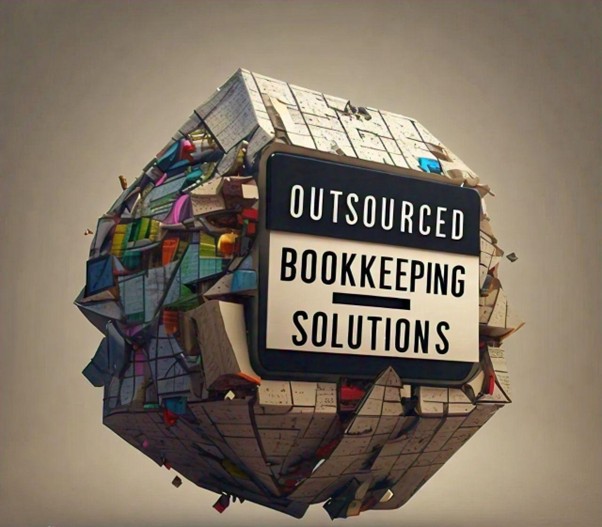REVOLUTIONIZE YOUR FINANCES: WHY OUTSOURCING BOOKKEEPING MAKES BRILLIANT BUSINESS SENSE
As a business owner in Canada, managing your finances effectively is crucial to your company’s success. One of the most critical aspects of financial management is bookkeeping. Accurate and up-to-date bookkeeping enables you to make informed decisions, ensure compliance with tax laws, and drive business growth. However, managing bookkeeping in-house can be time-consuming, costly, and prone to errors.
Outsourcing bookkeeping services can revolutionize your finances, providing numerous benefits that can transform your business. In this article, we’ll explore the advantages of outsourcing bookkeeping, address common pain points, and provide practical solutions.
WHAT IS BOOKKEEPING, AND WHY IS IT ESSENTIAL?

Bookkeeping is the process of recording, classifying, and reporting financial transactions. It involves managing accounts payable, accounts receivable, payroll, and other financial activities. Accurate bookkeeping is vital for:
1. Tax compliance: Ensuring you meet Canada Revenue Agency (CRA) requirements.
2. Financial decision-making: Providing insights into cash flow, profitability, and growth.
3. Budgeting and forecasting: Enabling you to create realistic financial plans.
THE CHALLENGES OF IN-HOUSE BOOKKEEPING
Managing bookkeeping in-house can be daunting, especially for small to medium-sized businesses. Common challenges include:
1. Lack of expertise: Bookkeeping requires specialized knowledge and training.
2. Time-consuming: Bookkeeping tasks can take away from core business activities.
3. Error-prone: Manual bookkeeping can lead to mistakes and inaccuracies.
4. Costly: Hiring and training in-house bookkeeping staff can be expensive.
THE BENEFITS OF OUTSOURCING BOOKKEEPING
Outsourcing bookkeeping services can alleviate these challenges and provide numerous benefits, including:
1. Expertise: Access to experienced and certified bookkeepers.
2. Time savings: Free up staff to focus on core business activities.
3. Accuracy: Reduced errors and inaccuracies.
4. Cost savings: Lower costs compared to hiring and training in-house staff.
5. Scalability: Easily adapt to changing business needs.
6. Security: Enhanced financial data security and compliance.
HOW OUTSOURCING BOOKKEEPING CAN REVOLUTIONIZE YOUR FINANCES
Outsourcing bookkeeping services can have a transformative impact on your business finances. Here are some ways:
1. Improved cash flow management: Accurate bookkeeping enables you to make informed decisions about cash flow.
2. Enhanced financial reporting: Outsourced bookkeeping provides timely and accurate financial reports.
3. Better budgeting and forecasting: Access to expert bookkeepers helps you create realistic financial plans.
4. Increased compliance: Outsourced bookkeeping ensures you meet CRA requirements and avoid penalties.
5. Reduced stress: Let experts handle bookkeeping tasks, freeing up your time and reducing stress.
FINANCIAL SENSE BOOKKEEPING

Financial sense bookkeeping refers to the process of managing and maintaining accurate financial records, while also making informed financial decisions that drive business growth and profitability. It involves not only recording financial transactions but also analyzing and interpreting financial data to make strategic business decisions.
KEY PRINCIPLES OF FINANCIAL SENSE BOOKKEEPING
1. Accurate Financial Recording: Maintaining accurate and up-to-date financial records is the foundation of financial sense bookkeeping. This includes recording all financial transactions, including income, expenses, assets, liabilities, and equity.
2. Financial Analysis: Financial analysis involves reviewing and interpreting financial data to identify trends, patterns, and areas for improvement. This includes analysing financial statements, such as balance sheets and income statements.
3. Informed Financial Decision-Making: Financial sense bookkeeping involves making informed financial decisions based on accurate financial data and analysis. This includes decisions related to budgeting, forecasting, and investing.
4. Cash Flow Management: Managing cash flow is critical to financial sense bookkeeping. This involves ensuring that the business has sufficient cash to meet its financial obligations, while also maximizing returns on investment.
5. Risk Management: Financial sense bookkeeping also involves identifying and managing financial risks, such as market risk, credit risk, and operational risk.
BENEFITS OF FINANCIAL SENSE BOOKKEEPING

1. Improved Financial Management: Financial sense bookkeeping provides a clear picture of a company’s financial situation, enabling informed financial decisions.
2. Increased Efficiency: Automating financial processes and maintaining accurate financial records can save time and reduce errors.
3. Enhanced Decision-Making: Financial sense bookkeeping provides valuable insights into a company’s financial performance, enabling data-driven decision-making.
4. Better Cash Flow Management: Financial sense bookkeeping helps companies manage cash flow more effectively, reducing the risk of cash flow problems.
5. Reduced Financial Risk: Financial sense bookkeeping involves identifying and managing financial risks, reducing the likelihood of financial losses.
BEST PRACTICES FOR IMPLEMENTING FINANCIAL SENSE BOOKKEEPING
1. Automate Financial Processes: Automating financial processes, such as invoicing and reconciliations, can save time and reduce errors.
2. Use Cloud-Based Accounting Software: Cloud-based accounting software provides real-time access to financial data, enabling more informed financial decision-making.
3. Maintain Accurate Financial Records: Maintaining accurate and up-to-date financial records is critical to financial sense bookkeeping.
4. Regularly Review Financial Statements: Regularly reviewing financial statements, such as balance sheets and income statements, can help identify areas for improvement.
5. Seek Professional Advice: Seeking professional advice from a certified accountant or bookkeeper can help ensure that financial sense bookkeeping practices are being followed.
By implementing financial sense bookkeeping practices, businesses can make more informed financial decisions, improve financial management, and drive growth and profitability.
OUTSOURCED BOOKKEEPING SOLUTIONS

Outsourced bookkeeping solutions refer to the practice of contracting a third-party provider to manage and maintain a company’s financial records. This can include tasks such as financial statement preparation, accounts payable and receivable management, payroll processing, and tax compliance.
TYPES OF OUTSOURCED BOOKKEEPING SOLUTIONS
1. Full-Service Bookkeeping: This type of solution involves outsourcing all bookkeeping tasks to a third-party provider.
2. Partial Bookkeeping: This type of solution involves outsourcing specific bookkeeping tasks, such as accounts payable or payroll processing.
3. Project-Based Bookkeeping: This type of solution involves outsourcing bookkeeping tasks on a project-by-project basis.
4. Cloud-Based Bookkeeping: This type of solution involves using cloud-based accounting software to outsource bookkeeping tasks.
BENEFITS OF OUTSOURCED BOOKKEEPING SOLUTIONS

1. Cost Savings: Outsourcing bookkeeping tasks can save companies money on staffing and training costs.
2. Increased Efficiency: Outsourced bookkeeping solutions can automate many bookkeeping tasks, increasing efficiency and reducing errors.
3. Improved Accuracy: Outsourced bookkeeping solutions can provide more accurate financial records, reducing the risk of errors and misstatements.
4. Enhanced Financial Reporting: Outsourced bookkeeping solutions can provide more detailed and timely financial reporting, enabling better decision-making.
5. Reduced Risk: Outsourced bookkeeping solutions can reduce the risk of financial mismanagement and non-compliance with regulatory requirements.
6. Improved Financial Reporting: Outsourced bookkeeping services can provide businesses with timely and accurate financial reports, enabling them to make informed financial decisions.
7. Reduced Errors: Outsourced bookkeeping services can reduce errors in financial record-keeping, as bookkeeping tasks are performed by experienced and trained professionals.
8. Scalability: Outsourced bookkeeping services can scale with a business’s growth, providing additional resources and expertise as needed.
9. Access to Expertise: Outsourced bookkeeping services can provide businesses with access to specialized bookkeeping expertise, including knowledge of tax laws and regulations.
10. Improved Cash Flow Management: Outsourced bookkeeping services can provide businesses with improved cash flow management, enabling them to better manage their financial resources.
11. Reduced Tax Liability: Outsourced bookkeeping services can help businesses reduce their tax liability, as bookkeeping tasks are performed by experienced and trained professionals who are knowledgeable about tax laws and regulations.
12. Increased Focus on Core Business Activities: Outsourced bookkeeping services can enable businesses to focus on their core activities, rather than spending time and resources on bookkeeping tasks.
Here are some statistics that highlight the financial benefit of outsourcing bookkeeping services:
– 60% of businesses that outsource bookkeeping services report cost savings (Source: CPA Canada)
– 55% of businesses that outsource bookkeeping services report improved financial reporting (Source: Accounting Today)
– 50% of businesses that outsource bookkeeping services report reduced errors in financial record-keeping (Source: Bookkeeper360)
These statistics demonstrate the financial benefit of outsourcing bookkeeping services and highlight the benefits of partnering with a professional bookkeeping service provider.
OUTSOURCED BOOKKEEPING SERVICES
1. Financial Statement Preparation: Preparation of financial statements, including balance sheets and income statements.
2. Accounts Payable and Receivable Management: Management of accounts payable and receivable, including invoicing and payment processing.
3. Payroll Processing: Processing of payroll, including calculation of salaries and wages, and preparation of payroll tax returns.
4. Tax Compliance: Preparation and filing of tax returns, including corporate tax returns and individual tax returns.
5. Budgeting and Forecasting: Preparation of budgets and forecasts, including financial modeling and analysis.
HOW TO CHOOSE AN OUTSOURCED BOOKKEEPING SOLUTION

1. Define Your Needs: Define your bookkeeping needs and requirements.
2. Research Providers: Research potential outsourced bookkeeping providers.
3. Evaluate Experience and Qualifications: Evaluate the experience and qualifications of potential providers.
4. Review Services and Pricing: Review the services and pricing offered by potential providers.
5. Check References: Check references and reviews from previous clients.
COMMON MISTAKES TO AVOID WHEN OUTSOURCING BOOKKEEPING
1. Not Defining Needs Clearly: Not defining bookkeeping needs and requirements clearly.
2. Not Researching Providers Thoroughly: Not researching potential outsourced bookkeeping providers thoroughly.
3. Not Evaluating Experience and Qualifications: Not evaluating the experience and qualifications of potential providers.
4. Not Reviewing Services and Pricing Carefully: Not reviewing the services and pricing offered by potential providers carefully.
5. Not Checking References: Not checking references and reviews from previous clients.
FINDING THE RIGHT BOOKKEEPING SERVICE PROVIDER

When outsourcing bookkeeping services, it’s essential to find a reliable and experienced provider. Here are some factors to consider:
1. Certifications: Look for providers with certified bookkeepers (CB) or certified public bookkeepers (CPB).
2. Experience: Ensure the provider has experience working with businesses similar to yours.
3. Technology: Choose a provider that uses cloud-based bookkeeping software for ease of access and collaboration.
4. Communication: Select a provider that offers regular communication and support.
FREQUENTLY ASKED QUESTIONS
GENERAL QUESTIONS
- Q: What is bookkeeping, and why is it essential for my business?
A: Bookkeeping is the process of recording and managing a company’s financial transactions. It’s crucial for making informed financial decisions, ensuring compliance with tax laws, and driving business growth.
- Q: How can outsourcing bookkeeping help my business?
A: Outsourcing bookkeeping can help your business by providing accurate and timely financial reports, reducing errors and inaccuracies, and optimizing financial processes.
BENEFITS OF OUTSOURCING BOOKKEEPING
- Q: How can outsourcing bookkeeping improve my business’s financial management?
A: Outsourcing bookkeeping can improve your business’s financial management by providing a clear picture of your company’s financial situation, enabling you to make informed decisions about investments, expansions, and other growth opportunities.
- Q: Can outsourcing bookkeeping help my business reduce costs?
A: Yes, outsourcing bookkeeping can help your business reduce costs by minimizing staffing and training costs, reducing errors and inaccuracies, and optimizing financial processes.
- Q: How can outsourcing bookkeeping help my business improve cash flow management?
A: Outsourcing bookkeeping can help your business improve cash flow management by providing accurate and timely financial reports, enabling you to make informed decisions about cash flow management.
SECURITY AND COMPLIANCE
- Q: Is outsourcing bookkeeping secure, and how can I protect my business’s financial data?
A: Reputable bookkeeping providers use robust security measures, such as encryption and two-factor authentication, to protect your business’s financial data.
- Q: How can I ensure that my outsourced bookkeeping provider is compliant with tax laws and regulatory requirements?
A: Look for a provider that is certified by a recognized accounting organization, such as the American Institute of Certified Public Accountants (AICPA), and has experience working with businesses in your industry.
IMPLEMENTATION AND TRANSITION
- Q: How do I transition my bookkeeping to an outsourced provider?
A: A reputable provider will work with you to transition your bookkeeping seamlessly, ensuring minimal disruption to your business operations.
- Q: What kind of support can I expect from an outsourced bookkeeping provider?
A: A reputable provider will offer ongoing support, including regular communication, training, and assistance with financial planning and decision-making.
COST AND PRICING
- Q: How much does outsourcing bookkeeping cost?
A: The cost of outsourcing bookkeeping varies depending on the provider, services required, and business size. Expect to pay between $500 to $2,000 per month.
- Q: What are the typical pricing models for outsourced bookkeeping services?
A: Common pricing models include flat-rate pricing, hourly billing, and value-based pricing.
CERTIFICATIONS AND QUALIFICATIONS
- Q: What certifications and qualifications should I look for in an outsourced bookkeeping provider?
A: Look for certifications from recognized accounting organizations, such as the AICPA, and experience working with businesses in your industry.
- Q: How can I verify the qualifications and experience of an outsourced bookkeeping provider?
A: Check for certifications, ask for references, and review the provider’s experience and qualifications on their website or LinkedIn profile.
TECHNOLOGY AND INTEGRATION
- Q: What kind of technology do outsourced bookkeeping providers use?
A: Reputable providers use cloud-based accounting software, such as QuickBooks or Xero, to manage and maintain financial records.
- Q: How can I ensure that my outsourced bookkeeping provider integrates with my existing systems?
A: Look for a provider that has experience integrating with your existing systems, such as your accounting software or payment processing systems.
THINGS TO AVOID WHEN OUTSOURCING BOOKKEEPING
1. Not researching the provider thoroughly: Ensure you research the provider’s certifications, experience, and reputation.
2. Not clearly defining the scope of work: Clearly outline the services required and expected outcomes.
3. Not establishing regular communication: Regular communication is crucial to ensure your financial needs are being met.
CONCLUSION
Outsourcing bookkeeping services can revolutionize your finances, providing numerous benefits that can transform your business. By understanding the challenges of in-house bookkeeping and the advantages of outsourcing, you can make an informed decision that drives business growth and success.
CALL TO ACTION
Ready to revolutionize your finances? Book a consultation with our expert bookkeepers today at sjohn@glhaccounting.ca and discover how outsourcing bookkeeping services can benefit your business.
ABOUT AUTHOR
Shanel John is a dedicated Certified Public Accountant (CPA) at G.L.H. Accounting, specializing in Income Tax with 10 years of experience. Based in Brampton, Ontario, Canada, Shanel offers expertise in tax preparation, financial accounting, and advisory services. A certified QBO Pro Advisor, Shanel’s decade-long experience and knowledge make her a trusted figure in the accounting field.
ADDITIONAL RESOURCES
- Canada Revenue Agency (CRA):
https://www.canada.ca/en/revenue-agency.html
- Certified Professional Bookkeepers of Canada (CPB):

